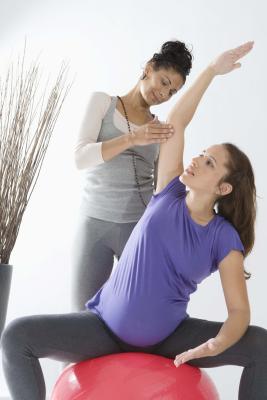Exercise can be a great benefit to you when you are pregnant. Exercise improves your circulation, which helps common pregnancy problems, such as constipation, hemorrhoids and swelling. Exercise gives you more energy, helps you sleep better, puts you in a better mood, prepares you for the delivery and helps you to get back to your pre-pregnancy weight sooner. But, exercise during pregnancy comes with certain risks, so understand what those are before you start your exercise program.
Check With Doctor
Women who have a high-risk pregnancy or who are at-risk for going into labor pre-term must check with their doctor before starting an exercise program. You don’t want to cause any additional problems for the baby. You may be able to do some exercise, but you should have your doctor monitor you.
Exercise in Moderation
When you exercise, don’t overdo it. You want to exercise at a moderate level, not at a hardcore pace. A good rule of thumb to determine whether you are exercising too strenuously is whether you can carry on a conversation while you exercise. Otherwise, you can restrict the oxygen to your baby. When you exercise too strenuously, your oxygen is going toward your muscles, lungs and heart and away from your uterus.
Exercise to Avoid
Stay away from sports that could cause you to fall down, such as downhill skiing and horseback riding. Avoid contact sports, like basketball and soccer, to avoid being hit in the abdomen and jarred around. Avoid laying down flat on your back when you exercise after your first trimester because that position can decrease the blood flow to your baby.
Your Body Temperature
Be careful not to become overheated. For example, practicing yoga is good when you are pregnant, but hot yoga in a 90 F room is not. You shouldn’t exercise in extremely hot weather. You need to keep your body temperature below 101 F. You could cause problems or even birth defects if you get overheated. Drink plenty of water when you exercise to help keep your body temperature down and to avoid dehydration.
Warning Signs
If, at any time during your exercise, you feel pain, dizziness, fatigue, nausea, shortness of breath or heart palpitations, stop immediately. Watch for blurred vision when you exercise because that is a sign of dehydration. If that happens, your blood pressure goes up and your baby might not get enough blood. Sharp, recurring pain in your abdomen could mean you’ve gone into labor. Call your doctor who can hook you up to a fetal monitor.





